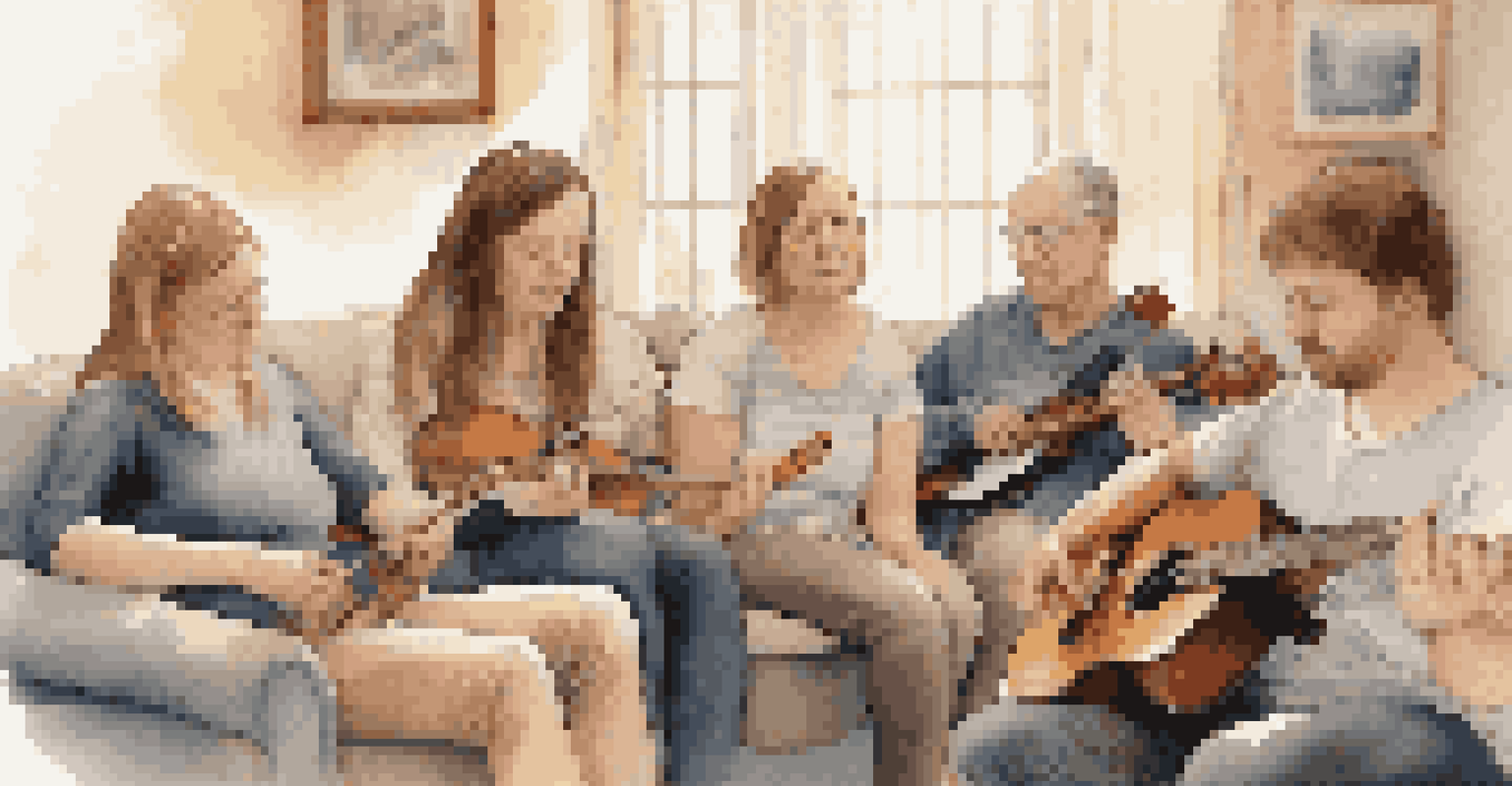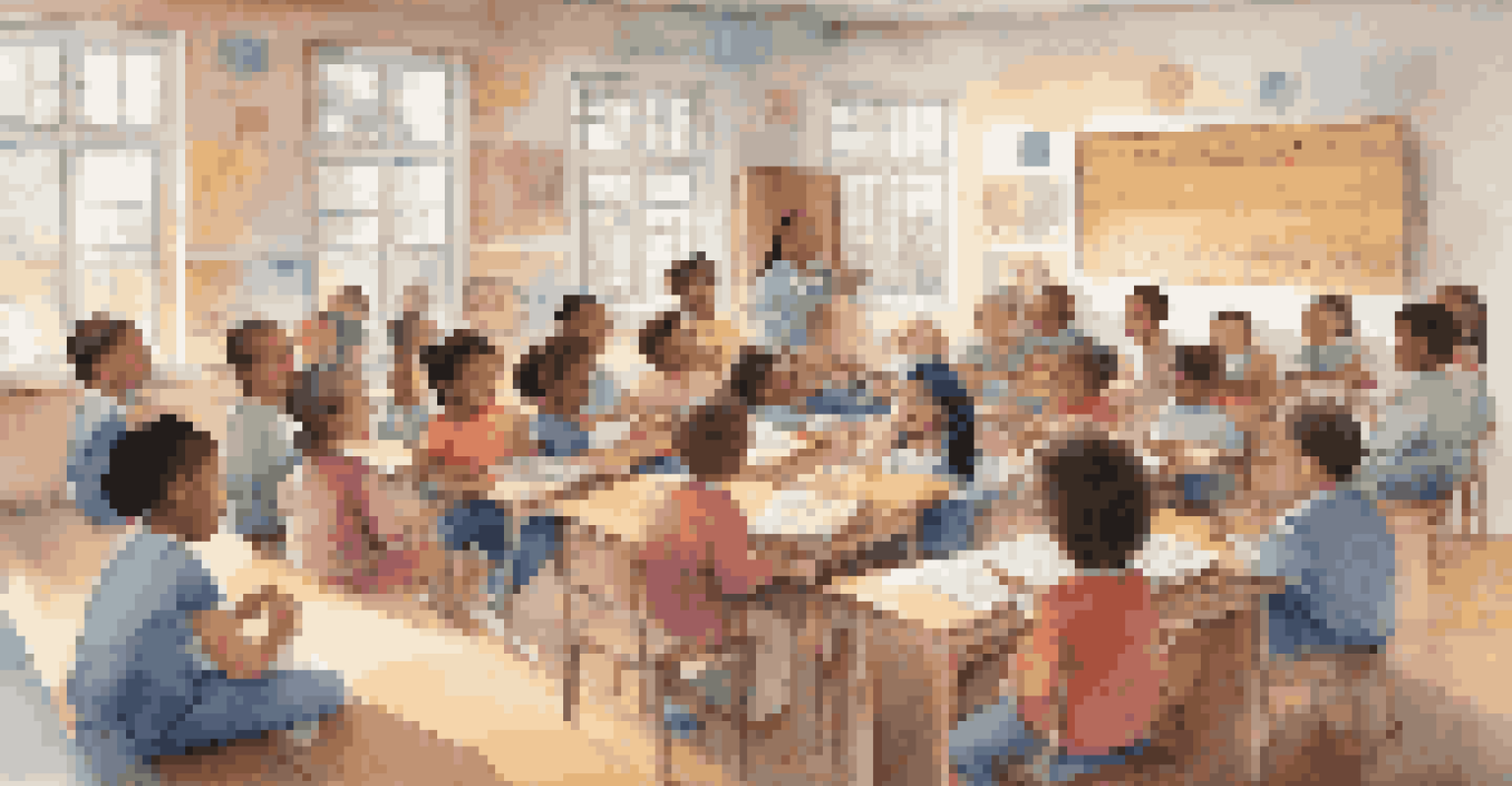The Role of Music in Conflict Resolution and Cultural Healing

Understanding Music's Emotional Impact on Individuals
Music has a unique ability to evoke emotions and memories, often connecting deeply with our personal experiences. This emotional resonance can help individuals express feelings that might otherwise be difficult to articulate. For instance, a song that reminds someone of a loved one can bring both joy and sorrow, facilitating a healing process.
Music can change the world because it can change people.
When people are involved in conflicts, they often struggle to communicate their emotions effectively. Music can bridge this gap by providing a safe space where individuals can explore their feelings. By listening to music or creating their own, they can process emotions, making it easier to engage in meaningful dialogue.
Moreover, studies have shown that shared musical experiences can foster empathy and understanding among individuals. When people come together to enjoy or create music, they build connections that can transcend their differences, setting the stage for conflict resolution.
Music as a Tool for Cultural Identity and Unity
Cultural identity often plays a significant role in conflicts, with music serving as a powerful expression of that identity. Traditional songs and rhythms encapsulate the history and values of a community, helping to reinforce a sense of belonging. By sharing these musical traditions, communities can promote understanding and appreciation of each other's backgrounds.

In times of conflict, music can act as a unifying force, bringing together diverse groups to celebrate their shared humanity. For example, joint musical performances can highlight common values and experiences, fostering a sense of solidarity. This unity can be essential in addressing the underlying issues that fuel conflict.
Music Enhances Emotional Expression
Music can evoke emotions and memories, providing individuals with a means to express feelings that might otherwise be difficult to articulate.
Furthermore, music festivals and collaborative projects can promote peace by encouraging dialogue and cooperation between different cultural groups. These events not only showcase diverse musical expressions but also create opportunities for individuals to connect and learn from one another.
The Therapeutic Role of Music in Healing Trauma
For individuals affected by conflict, trauma can manifest in various ways, often making it challenging to cope with their experiences. Music therapy has emerged as an effective approach to help individuals process trauma, offering a creative outlet for healing. Through guided sessions, individuals can explore their feelings and find solace in music.
Where words fail, music speaks.
Incorporating music into therapeutic practices has proven beneficial for many, as it allows individuals to confront their pain in a safe environment. Whether through songwriting, listening, or performing, music can serve as a catalyst for emotional release and recovery. This process encourages individuals to reclaim their narratives and rebuild their lives.
Moreover, community-based music initiatives often provide a sense of belonging for those who have experienced trauma. By participating in group music activities, individuals can connect with others who share similar experiences, fostering a supportive environment that promotes healing.
Case Studies: Successful Music Interventions in Conflicts
Numerous case studies illustrate the transformative power of music in conflict resolution. For instance, in post-apartheid South Africa, music played a crucial role in the reconciliation process. Artists collaborated on projects that celebrated unity, using music as a tool to bridge divides and promote healing.
Another compelling example comes from the civil war in Bosnia, where musicians from different ethnic backgrounds came together to create a collaborative album. This project not only showcased the rich musical heritage of the region but also fostered dialogue among previously divided communities, demonstrating the potential of music to heal wounds.
Music Fosters Cultural Unity
By celebrating shared musical traditions, communities can promote understanding and solidarity, especially during times of conflict.
These case studies highlight how music can facilitate conversations that might otherwise be too difficult to initiate. By creating shared experiences, music can help break down barriers, making it a powerful ally in the pursuit of peace.
The Science Behind Music and Conflict Resolution
Research has shown that music can significantly impact our brain and body, influencing our emotions and behavior. The release of endorphins during musical activities can promote feelings of happiness and relaxation, reducing stress levels. This physiological response can be particularly beneficial in high-tension situations, where conflicts often arise.
Furthermore, studies indicate that group music-making can enhance social cohesion, fostering a sense of belonging among participants. When individuals collaborate to create music, they develop trust and empathy, essential components for effective conflict resolution. This scientific understanding underpins the effectiveness of music in healing cultural rifts.
The intersection of music and psychology sheds light on how we can harness this art form to promote peace. By understanding the mechanisms at play, we can better design interventions that utilize music as a strategic tool in conflict resolution.
The Role of Music in Peacebuilding Initiatives
Peacebuilding initiatives often seek to address the root causes of conflict, and music can play a crucial role in this process. By integrating music into peacebuilding strategies, organizations can create inclusive spaces for dialogue and understanding. Music-based programs can facilitate conversations that help communities reconcile past grievances.
Moreover, engaging local musicians in peacebuilding efforts can empower communities to take ownership of their healing processes. By showcasing local talent, these initiatives celebrate cultural heritage while promoting unity among diverse groups. Such grassroots efforts can have lasting impacts on community cohesion.
Music Therapy Aids Trauma Recovery
Incorporating music into therapeutic practices offers a creative outlet for individuals to process trauma and connect with others experiencing similar challenges.
Incorporating music into educational programs also plays a vital role in fostering a culture of peace. By teaching children about the significance of music in conflict resolution, we can instill values of empathy and cooperation from an early age, paving the way for a more peaceful future.
Challenges and Limitations of Using Music for Healing
While music holds great potential for conflict resolution, it is not a panacea. There are challenges and limitations that practitioners must consider when implementing music-based interventions. For instance, cultural differences may influence how individuals perceive and respond to music, making it essential to tailor approaches to specific contexts.
Additionally, not everyone may feel comfortable expressing emotions through music, which can hinder participation in therapeutic or collaborative activities. Some individuals may prefer other forms of communication, emphasizing the importance of offering diverse methods for healing and dialogue.

Lastly, the effectiveness of music in conflict resolution often depends on the broader socio-political context. In environments where systemic issues persist, music alone may not be sufficient to drive meaningful change. A holistic approach that combines music with other strategies is crucial for achieving lasting peace.
Conclusion: Embracing Music as a Pathway to Peace
In conclusion, music presents a powerful avenue for conflict resolution and cultural healing. Its ability to evoke emotions, foster connections, and facilitate dialogue makes it an invaluable tool in addressing the complexities of human relationships. By embracing music as a pathway to peace, we can harness its transformative power to bridge divides and promote understanding.
As we reflect on the various roles music plays in healing, it becomes clear that collaboration and creativity are essential components of conflict resolution. By bringing together diverse voices and musical traditions, we can create harmonious solutions to our shared challenges.
Ultimately, music reminds us of our shared humanity and the possibilities for healing that lie within. By valuing and promoting the role of music in our communities, we can work towards a more peaceful and inclusive world.